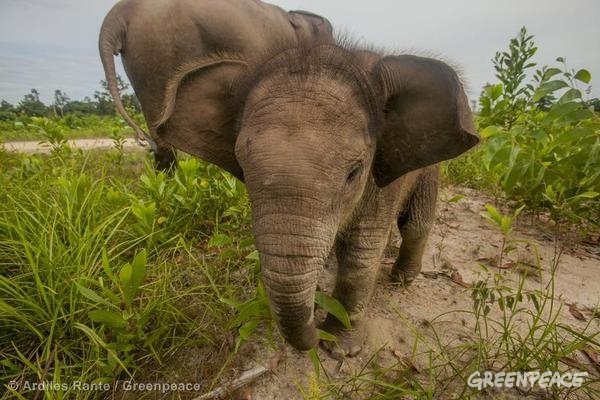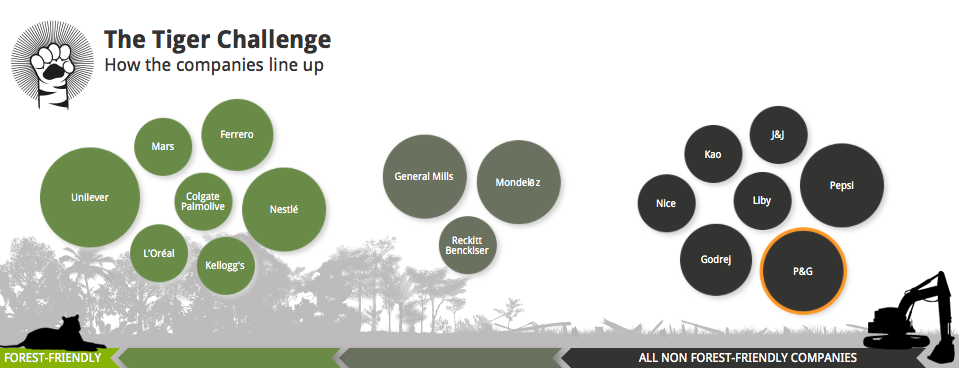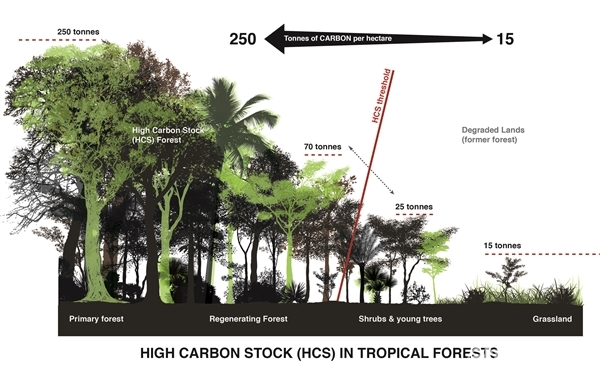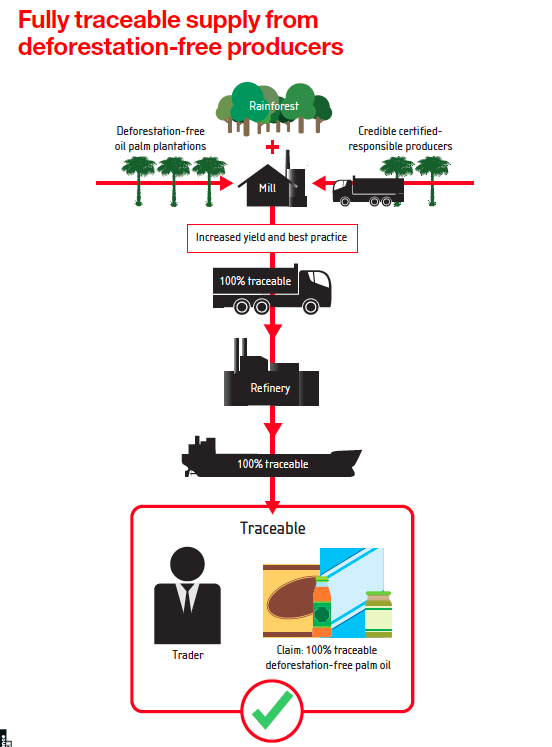
What makes a company forest friendly?
Since Greenpeace developed a set of criteria last year and stepped up its campaigning, there has been a huge transformation in the palm oil industry.
From producers and traders like GAR and Wilmar to consumers like LOreal, Colgate Palmolive and Mars, companies are finally beginning to commit to no deforestation policies. Some of these policies involve better timelines and some more robust implementation – but they all indicate a growing market demand for responsible palm oil and derivatives.
Email the CEO of Procter & Gamble now to tell him to commit to sustainable palm oil
How the industry has changed
Greenpeace released its first version of criteria companies should adopt to stop forest destruction as the Tiger Challenge in November 2013. The aim was to compare and contrast the sourcing policies of major consumer companies globally. This is how the Tiger Challenge looks like as of yesterday:
The companies are weighed on the basis of how effective their policy is at achieving no deforestation, and over the past few months, we have seen Mars, Kelloggs, Hersheys, Delhaize, Safeway, Orkla and Colgate Palmolive commit to policies that are very clearly moving away from the overwhelming reliance on the RSPO standards and taking greater responsibility for their supply chains.
To be considered as forest friendly, these companies revised their existing sourcing policies to ensure that forest destruction would not enter their supply chains.
The key elements in a forest friendly policy
1. A Commitment to No Deforestation
A commitment to stop deforestation can take many forms. Many companies rely on just the RSPO certification to achieve this goal, but Greenpeace investigations have repeatedly exposed serious violations by RSPO members including links to tiger and orangutan habitat destruction and links to forest fires. This is because the same old problems with the RSPO persist: the standards are not sufficient to ensure that palm oil is deforestation free and their ineffectual implementation only makes things worse.
All the companies that are in the forest friendly category make conscious efforts to go beyond RSPO standards. Nestle, Unilever, LOreal, Kellogg’s, Colgate-Palmolive, Mars and Ferrero have all proven with their policies that RSPO is simply not enough. In addition they have explicit commitments to protection of peat, High Conservation Value (HCV), High Conservation Stock (HCS) and free prior and informed consent (FPIC) when it comes to working with local communities.
2. Putting and end to deforestation into practice
Greenpeace, along with other NGOs and palm oil companies has developed a set of approaches that, once implemented, allows the clear identification of which areas must be protected and which ones could be converted into plantations.
Considerable work has been done by Greenpeace, GAR and TFT to develop a robust methodology to identify and conserve High Carbon Stock forests (HCS). This approach, in combination with a strong HCV-assessment (http://www.hcvnetwork.org/) and proper FPIC implementation, should be used to put a no deforestation commitment into practice. Part of putting a No Deforestation commitment in practice through the HCS-approach is participatory mapping to ensure that the rights and livelihoods of local communities are protected.
Without the incorporation of these definitions, suppliers wont know what is expected from them. Its like going into an ice cream shop and only asking for an ice cream. You can end up with a triple cherry chocolate cone, or you can end up with fish liver bubblegum.
GAR, Mars, Unilever, Nestle, Colgate, Safeway, Wilmar and DelHaize include good definitions of what they mean by No Deforestation on their policies. Kellogg, General Mills, and Ferrero dont.
What happens without a definition? Well, in all likelihood more deforestation. With tiger and orangutan populations on the decline, its important that deforestation stops now.
3. Benefiting the people
The forests are not only home to tigers and orangutans. Around the world, millions of people live in or around forest areas and many are heavily impacted by deforestation – especially communities and indigenous groups. To be ‘forest friendly’ a company needs to guarantee that its products are not fueling social conflicts, as land grabs and violations of human and labor rights. It must also ensure smallholders inclusion and guarantee communities and indigenous groups the right to give or withhold their Free, Prior and Informed Consent (FPIC) for developments in their lands.
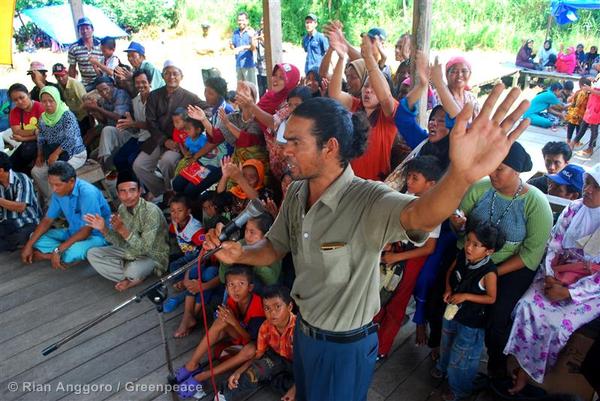
Villagers celebrating the re-opening of the Community Camp for Peatland Forest at Kampar Peninsula Forest.
4. Traceability: Knowing where your palm oil comes from
All the companies in the forest-friendly zone on our Tiger Challenge have made a commitment to 100% traceability. Colgate, Ferrero and Mars, trace their palm oil back to the plantation – which gives these companies greater leverage and control over their supply chains and allow them to quickly identify and fix any links to deforestation within their supply chains. Unilever and others on the other hand only trace back to the mill – so they have no way of knowing what happens before the oil palm arrives there – and thats exactly where the deforestation is happening.
5. Applicable to all products that come from oil palm
Palm oil is not just one commodity – its versatility is what it makes it so sought after. Its fruit and its kernels create different extracts which are used in different ways. Although supply chains differ in complexity, for a policy to ensure that forest destruction stays out of a product, it needs to be equally applicable across all products derived from the oil palm tree.
6. Industry-wide change
The transformation of the palm oil industry that we need will only happen if consumer companies source only from suppliers that are able to demonstrate that they have severed all links with forest destruction. For this to succeed, it is critical that these policies apply to all of the suppliers operations and to its third party suppliers, not just to a particular supply chain. Otherwise, we might end up with some good plantations selling good palm oil to the companies that have No Deforestation policies while unabated deforestation continues in other plantations.
Policies by Mars, Ferrero, Unilever, Nestle and Colgate clearly state that these companies would prioritise working with progressive suppliers that apply No Deforestation policies to their entire operations.
7. Ambitious timelines and milestones
A policy is only as good as its implementation. And as forests are quickly disappearing, a No Deforestation policy has to be implemented fast! Thats why ambitious timeframes are so important. While LOreal, Unilever, Colgate and Kelloggs have committed to a time-bound plan, they seem to be okay with deforestation happening for another 6 years. Only Ferrero, Mars and General Mills carry ambitious 2015 timelines.
If we continue with business as usual, a predicted 3.72 million hectares of forest could disappear in Indonesia by 2020. The Sumatran tiger will be pushed to the brink of extinction and countless tons of carbon will have be released into the atmosphere.
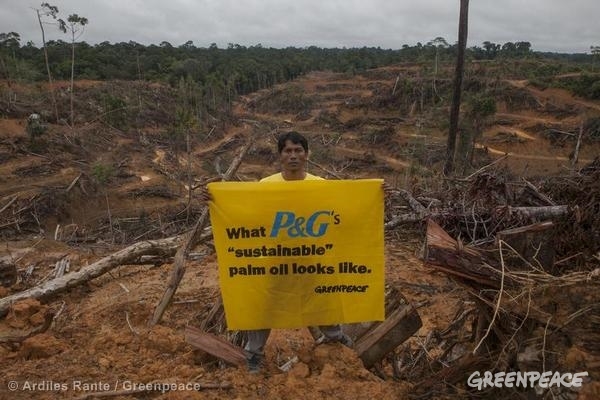
A Greenpeace activist holds a banner inside the palm oil concession of a palm oil supplier to Procter and Gamble.
Whos next?
Thousands of people have joined us to demand an ambitious policy from Procter & Gamble. We are hoping that theirs will use the best of this examples to support the growing movement to stop deforestation for palm oil. Click here to email them.
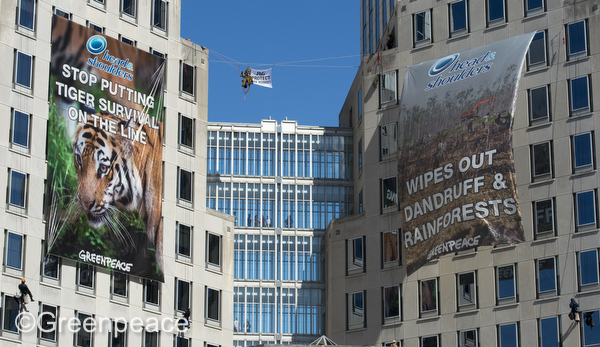
Greenpeace activists protest at Procter & Gambles global headquarters in Cincinnati, Ohio, March 4, 2014, calling attention the company’s link to tropical deforestation.
Of course, this doesnt let Pepsico, Johnson & Johnson, Reckitt Benckiser, Estee Lauder, Liby and others off the hook. Along with Procter & Gamble, these are the biggest companies left who must urgently commit to changing their policies.

